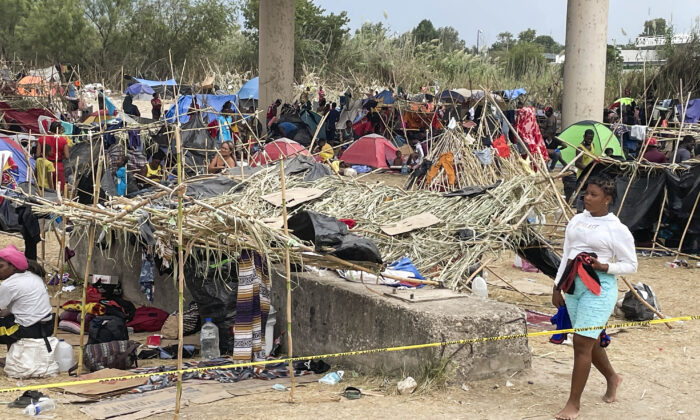They will probably all try and flee again. I doubt many will say I am going to stay here and build my country. Many will probably try for the DR and now they learned Spanish in Chile.Back in Haiti, expelled migrant family plans to flee again
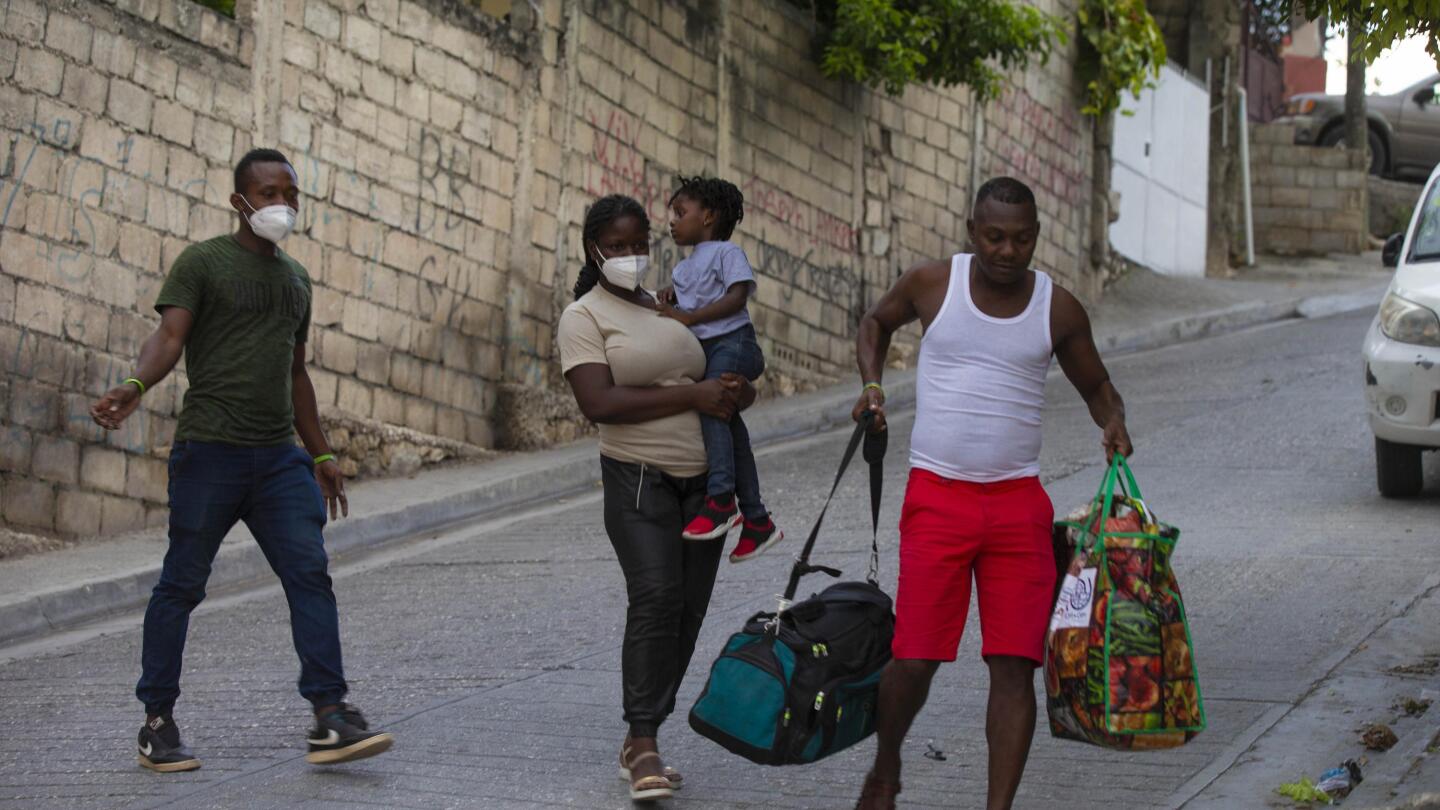
Back in Haiti, expelled migrant family plans to flee again
The U.S. has expelled some 2,000 migrants to Haiti this week via more than 17 flights, with several more scheduled in upcoming days.apnews.com
- Thread starter AlterEgo
- Start date
You are using an out of date browser. It may not display this or other websites correctly.
You should upgrade or use an alternative browser.
You should upgrade or use an alternative browser.
Haitians at USA/Mexico border
They will probably all try and flee again. I doubt many will say I am going to stay here and build my country. Many will probably try for the DR and now they learned Spanish in Chile.
If they're legal in Chile or Brazil, they should try that first. Haitians in the DR, especially newer ones, don't have it easy. It's better that Haiti of course, but not a whole lot better.
They should never have left Chile or Brazil in the first place. But try telling them that.
A Dominican-Haitian says this:They will probably all try and flee again. I doubt many will say I am going to stay here and build my country. Many will probably try for the DR and now they learned Spanish in Chile.
“This is not what I imagined, being here,” said Celestin’s wife, 26-year-old Delta de León, who was born in the Dominican Republic to a Dominican father and a Haitian mother. “But here I am, although I hope to leave soon because the one thing I’ve never wanted for my daughter is for her to grow up here.”
De León intends to cross the border into the Dominican Republic with her daughter as soon as possible to reunite with her father, sister and brother while her husband flies ahead to Chile.
“The future I want for her is a better life, a more comfortable one, the kind a poor person can give their children,” she said. “If that life has to be in the United States, so be it. If it has to be in Chile, let it be in Chile. But let it be a better life.”
She and her family has seen countries richer than the DR, such as Chile. Her husband is already set on returning to Chile and, by the looks of things, the woman and her Chile-born daughter will follow. At least for them, DR is not an option.
We can agree on that. I actually doubt many of them were legal in Lat Am.If they're legal in Chile or Brazil, they should try that first. Haitians in the DR, especially newer ones, don't have it easy. It's better that Haiti of course, but not a whole lot better.
They should never have left Chile or Brazil in the first place. But try telling them that.
I'm guessing many entered on tourist visas and never got legal resident status. Chile and Brazil are far, far better countries that Haiti. If they can't make it there, they can't make it anywhere.If they're legal in Chile or Brazil, they should try that first. Haitians in the DR, especially newer ones, don't have it easy. It's better that Haiti of course, but not a whole lot better.
They should never have left Chile or Brazil in the first place. But try telling them that.
Is there currently a country not undergoing an actual war that is worse than Haiti? Even Venezuela, as awful as it is now?I'm guessing many entered on tourist visas and never got legal resident status. Chile and Brazil are far, far better countries that Haiti. If they can't make it there, they can't make it anywhere.
It would be difficult for Haitians to be legal in Chile. I imagine they fly into Bolivia and illegally enter Chile? Or maybe a tourist visa?
Brazil also requires a visa to enter.
It has been a challenge for a friend from the US, worth over $2 Million US, to remain legally in Chile where he has retired and uses the best lawyers.
Legal residency is not easy to get there.
Is there currently a country not undergoing an actual war that is worse than Haiti? Even Venezuela, as awful as it is now?
It would be difficult for Haitians to be legal in Chile. I imagine they fly into Bolivia and illegally enter Chile? Or maybe a tourist visa?
Brazil also requires a visa to enter.
It has been a challenge for a friend from the US, worth over $2 Million US, to remain legally in Chile where he has retired and uses the best lawyers.
Legal residency is not easy to get there.
I can only comment on the 2 Haitians I know who went to Chile. They are both legal.
How did they accomplish that?I can only comment on the 2 Haitians I know who went to Chile. They are both legal.
How did they accomplish that?
It was legal at one point for them to fly into Chile on a guest visa of some type and then apply for residency. This goes back about 5 years. Both guys did just that and they legally worked in Chile until the Wuhan flu quarantines. The one that's still there did not lose his job even during the quarantine. The other one did which is why he left for the USA. I have not heard from him in almost a month. I suspect he was one of those in south Texas but I can't confirm that.
Yes, very difficult to get residency in Chile and only a few probably qualified for residency in Brazil. I've read accounts of Haitians working as butchers in Peru, but who knows if they were legal(?).Is there currently a country not undergoing an actual war that is worse than Haiti? Even Venezuela, as awful as it is now?
It would be difficult for Haitians to be legal in Chile. I imagine they fly into Bolivia and illegally enter Chile? Or maybe a tourist visa?
Brazil also requires a visa to enter.
It has been a challenge for a friend from the US, worth over $2 Million US, to remain legally in Chile where he has retired and uses the best lawyers.
Legal residency is not easy to get there.
It was posted before that, after the 2010 earthquake, a couple S.A. countries(Brazil in particular) loosened the visa requirements for Haitians as an humanitarian gesture and that's where many of them entered and moved on from there.

Haitians in Peru: the transit routes they use and their current situation in the country | PERU
According to the criteria of Know more The earthquake that struck Haiti last Saturday it further hit the impoverished Caribbean country, which was already grappling with the COVID-19 pandemic, increased gang violence and a severe political crisis following the assassination of President Jovenel...
That sounds more like it. I knew that number of 10,000 posted earlier as having been returned to Mexico was totally bogus.
It seems they are fed up in Chile with illegal immigration. In this case demonstrating against illegal immigration from Venezuela but I am sure from Haiti to. I don’t mean to go off topic
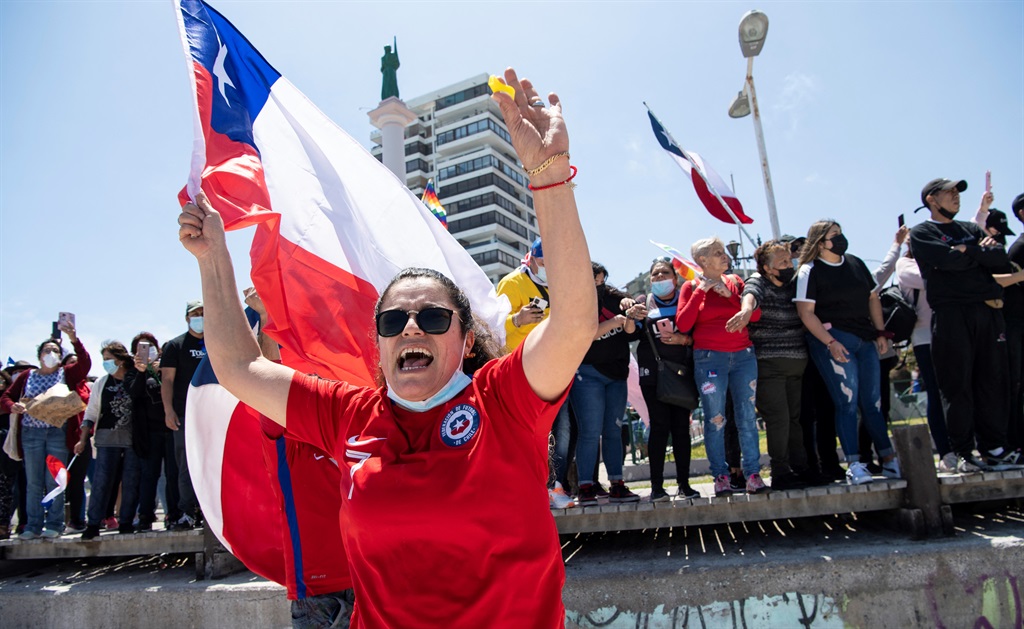
 www.google.com
www.google.com

Demonstrators in northern Chile protest against Venezuela migrants | News24
About 3 000 people have marched Iquique to protest the presence of undocumented Venezuelans, with some demonstrators scuffling with migrants.
This was part of that anti-illegal-immigration protest in Iquique, Chile. What appears to be a group of Haitians went into a business for protection. The baby was was choking, as can be seen in the video and the scream of the mother. Things calm down with the arrival of the police in riot gear.
This was part of that anti-illegal-immigration protest in Iquique, Chile. What appears to be a group of Haitians went into a business for protection. The baby was was choking, as can be seen in the video and the scream of the mother. Things calm down with the arrival of the police in riot gear.
Nals,
Completely off topic pero como te sientes?
Espero que bien amigo.
I guess that was my fault. I apologizeNals,
Completely off topic pero como te sientes?
Espero que bien amigo.
Cuba is sending them home too. Computer translated:
Havana
The Cuban Foreign Ministry announced this Wednesday that it has received and assisted several Haitian migrants who were stranded on the island on their sea voyage to the United States and will return them to their country of origin.
The Haitians, whose boats reached Cuban shores in recent days, "have received all the necessary care, including medical assistance, and remain housed in various facilities equipped for it," according to a press release from the Cuban Foreign Ministry.
It adds, without specifying the number of migrants served, that it is already in contact with the Haitian Government to manage and ensure "the safe and voluntary return of these people to their country."
The government has added that Haitians arrived in the country in boats through provinces in the central and eastern regions and their purpose was to reach the United States.
Haiti, the poorest country in America, has been expelling its citizens for years due to the growing deterioration of the economic, political and security situation, in addition to natural disasters, especially the 2010 earthquake.
Haitian Prime Minister Ariel Henry warned last Saturday at the UN that emigration "will not stop" as long as the disparities between rich and poor countries, like his, persist.
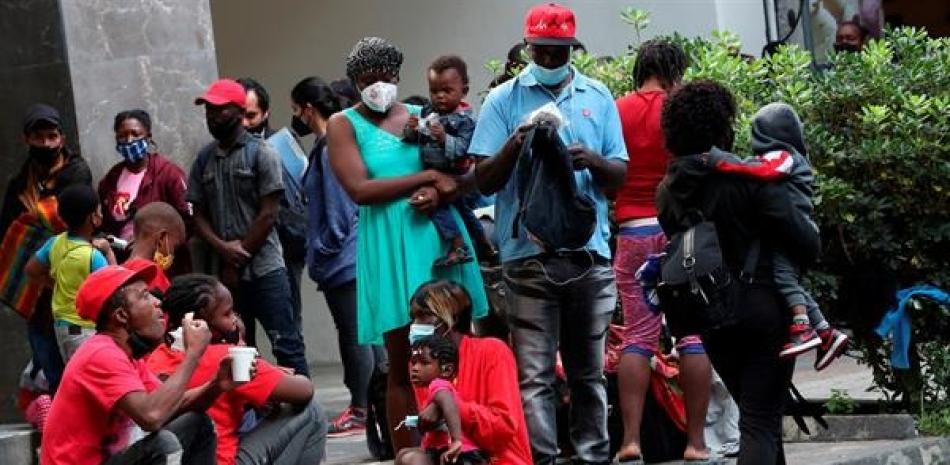
 listindiario.com
listindiario.com
Cuba receives Haitian migrants and will return them to their country
|
Havana
The Cuban Foreign Ministry announced this Wednesday that it has received and assisted several Haitian migrants who were stranded on the island on their sea voyage to the United States and will return them to their country of origin.
The Haitians, whose boats reached Cuban shores in recent days, "have received all the necessary care, including medical assistance, and remain housed in various facilities equipped for it," according to a press release from the Cuban Foreign Ministry.
It adds, without specifying the number of migrants served, that it is already in contact with the Haitian Government to manage and ensure "the safe and voluntary return of these people to their country."
The government has added that Haitians arrived in the country in boats through provinces in the central and eastern regions and their purpose was to reach the United States.
Haiti, the poorest country in America, has been expelling its citizens for years due to the growing deterioration of the economic, political and security situation, in addition to natural disasters, especially the 2010 earthquake.
Haitian Prime Minister Ariel Henry warned last Saturday at the UN that emigration "will not stop" as long as the disparities between rich and poor countries, like his, persist.

Cuba recibe a migrantes haitianos y los devolverá a su país
El Ministerio de Exteriores de Cuba comunicó este miércoles que ha recibido y asistido a varios migrantes haitianos que quedar
Opinion piece about Haitians fleeing Haiti, computer translated:
Interactions
Focus
Carlos R. Altuna Tezanos
Santo Domingo, RD
On January 12, 2010, the date that would attribute the emergence of an overflowing Haitian migrant that affects the security of the entire region of the American continent, whose tip of the “migratory iceberg” only the Dominican Republic warned, since it suffered the onslaught of its effects a lot. before the devastating earthquake that wreaked havoc in Port-au-Prince, causing the death of some 316,000 people, 350,000 injured and 1.5 million homeless, considered one of the most serious humanitarian catastrophes in history.
This event was undoubtedly the trigger that led to the largest exodus of Haitians up to that time. But, although eleven years have passed since that fateful event, we see how this Caribbean nation has been trapped in a whirlwind of social, economic and political degradation, which with the inexorable passage of time turned it into a failed and unviable state.
In the middle of the year 2021, two terrible misfortunes befall him in a sequential manner: the assassination of President Jovenel Moïse (July 7) and the earthquake that occurred in the city of Les Cayes (August 14), a context that rapidly increased even more the dire situation prevailing. of Haiti, transfiguring in an inhospitable and unviable area to live.
Misfortune seems to be an intrinsic peculiarity in this nation, just look at its history. Unfortunately, Haiti continues to be trapped in time and space in its ancestral circumstances, clinging to an eternal "circle of chaos", where an oligarchy that benefits from the violence, corruption, destruction, impunity and ungovernability of a people mired in total poverty, and where the dominance of the strongest or the law imposed by the armed gangs prevails.
In this sense, the National Commission for Disarmament, Dismantling and Reintegration (CNDDR), assured about the existence of some 90 gangs and 500,000 illegal weapons circulating, which apparently govern and control the territory, filling a void left by decades of collapse, led by a former former police officer, Jimmy - Barbecue - Cherizier, who achieved a gang alliance in the so-called G9, in addition to having close ties with politicians and law enforcement.
Faced with the prevailing chaos, the UN humanitarian coordinator in Haiti, Bruno Lemarquis, pointed out that his work depended if the "will of the gangs" allowed him. Along the same lines, the director of Doctors without Borders, Julien Bartoletti, stated that the "situation is so dangerous, that it suggests thinking of the country as a war zone", which forced the closure of the Martissant hospital after 15 years of free services .
To all this, we should add the warning released in December 2019, by the World Food Program (WFP-UN), where it established that one in three Haitians –4 million people– demanded “urgent food assistance” and almost one million suffered from "severe hunger."
While the international community seems to be in a kind of induced coma, it candidly only observes how Haiti methodically disintegrates, limiting itself to offering humanitarian aid or helping it in the event of calamities or natural events. A reality that pushes Haitians to emigrate to any place, even though it costs them their lives.
Observing the current situation, it seems that they have strictly complied with one of the recommendations of the study carried out by the UN on May 26, 1947, called “A Mission in Haiti”. Although 75 years had passed since that premonition, that study suggested to the Haitian government at that time, as a warning, the following: “Aware of the fact that Haiti will be, for many years to come, imprisoned by an ever-growing population. The mission recommends that the possibility of encouraging emigration be examined with the greatest care, as a means of remedying the serious problem of overpopulation ”.
Migratory reality that at the moment only directly impacted the Dominican Republic, where approximately 1.5 million Haitian citizens live, and about five years ago to Brazil and Chile; The first, at the time, needed manpower to build the infrastructures for the World Cup (2014) and the Olympic Games in Rio de Janeiro (2020), receiving some 143,000. Chile was attracted by its economy and development, according to the National Institute of Statistics 1,492,522 foreigners reside in its territory, of which the Haitian community occupies a third place, with 186,565, equivalent to 12.5%.
Due to the effects of the pandemic, job loss, paralyzed economies and tightening of immigration laws, it forced Haitians to wander to other countries and, without orchestrating a directed plan, they focused as the objective of their migratory pilgrimage, the United States of North America.
This silent migratory flow became visible when, in a kind of funnel, they met in Necoclí, a Colombian town on the border with Panama, to cross the famous “Darien Gap” and continue their journey through Central America to the United States.
Today, Colombia, Central America and the United States suffer the brunt of an overwhelming Haitian migration, only with the difference that ours is permanent. Mexico, the last country before reaching their desired goal, made the city of Acuña an improvised refuge to then cross the Rio Grande, awaiting their application for immigration admission under the international bridge that connects with the North American city of Del Río. where between 15 and 20 thousand Haitians settled.
Overflow, which forced the US to react to stop the flow of Haitians who crossed uncontrollably into their territory in order to preserve their national security, where the dismayed world observed Dantesque scenes, of how the nation that exhibits dignity and Respect for human rights as the standard of its democracy, it expelled Haitians at any cost. This prompted the resignation of the United States special envoy in Haiti, Daniel Foote, who in his letter stated: "I will not associate myself with the inhumane and counterproductive decision of the United States to deport thousands of Haitian refugees and illegal migrants to Haiti."
Preamble, which served as an excellent platform for President Luis Abinader to address the Haitian situation during his speech to the 76th UN Assembly, taking advantage of this scenario to denounce to the world the serious crisis that Haiti is going through. Noting in his speech: “For years, every day, our country has faced, practically alone, these consequences. We are convinced that no unilateral action will be sufficient to overcome this dramatic situation ... He warned that given the current division that exists between the Haitian leadership and the dangerous presence of criminal gangs that control a good part of their territory, Haitians alone will not be able to pacify their country, much less guarantee the conditions to establish a minimum order ”.
He stated that “The Haitian situation may exceed the borders of that country, influencing as a factor of insecurity in the region. Hence, the need for this community of nations to assume urgently and once and for all, the Haitian crisis as one of the highest priority and of permanent monitoring ... It is imperative to express, as firmly and bluntly as possible, that the The international community should not, and cannot, abandon the Haitian people at this time when levels of insecurity are leading to their self-destruction ... The Haitian situation is a dramatic situation that, in order to face it, requested international collaboration with "high priority", due to that "there is not, nor will there ever be a Dominican solution to the crisis in Haiti." We are sure,
The author is a founding member of the Delta Circle
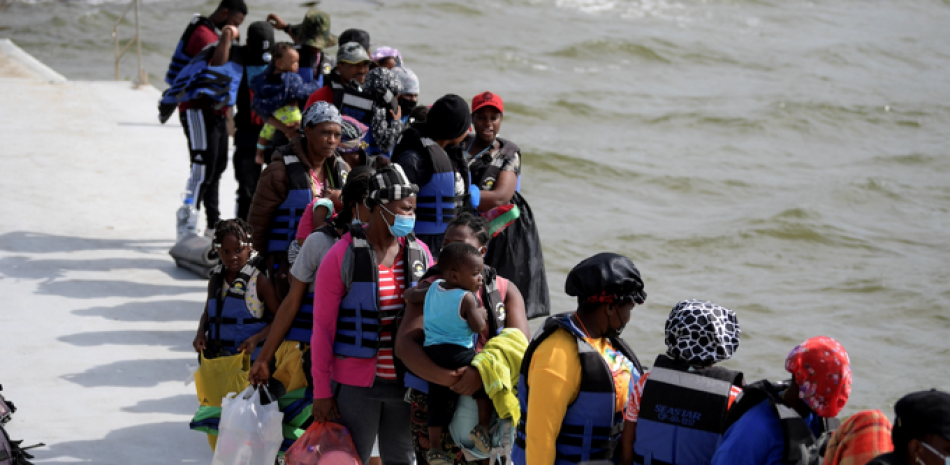
 listindiario.com
listindiario.com
La República Wednesday, September 29, 2021 | |
Interactions
Focus
Haiti: a migratory iceberg that violates hemispheric security
|
Carlos R. Altuna Tezanos
Santo Domingo, RD
On January 12, 2010, the date that would attribute the emergence of an overflowing Haitian migrant that affects the security of the entire region of the American continent, whose tip of the “migratory iceberg” only the Dominican Republic warned, since it suffered the onslaught of its effects a lot. before the devastating earthquake that wreaked havoc in Port-au-Prince, causing the death of some 316,000 people, 350,000 injured and 1.5 million homeless, considered one of the most serious humanitarian catastrophes in history.
This event was undoubtedly the trigger that led to the largest exodus of Haitians up to that time. But, although eleven years have passed since that fateful event, we see how this Caribbean nation has been trapped in a whirlwind of social, economic and political degradation, which with the inexorable passage of time turned it into a failed and unviable state.
In the middle of the year 2021, two terrible misfortunes befall him in a sequential manner: the assassination of President Jovenel Moïse (July 7) and the earthquake that occurred in the city of Les Cayes (August 14), a context that rapidly increased even more the dire situation prevailing. of Haiti, transfiguring in an inhospitable and unviable area to live.
Misfortune seems to be an intrinsic peculiarity in this nation, just look at its history. Unfortunately, Haiti continues to be trapped in time and space in its ancestral circumstances, clinging to an eternal "circle of chaos", where an oligarchy that benefits from the violence, corruption, destruction, impunity and ungovernability of a people mired in total poverty, and where the dominance of the strongest or the law imposed by the armed gangs prevails.
In this sense, the National Commission for Disarmament, Dismantling and Reintegration (CNDDR), assured about the existence of some 90 gangs and 500,000 illegal weapons circulating, which apparently govern and control the territory, filling a void left by decades of collapse, led by a former former police officer, Jimmy - Barbecue - Cherizier, who achieved a gang alliance in the so-called G9, in addition to having close ties with politicians and law enforcement.
Faced with the prevailing chaos, the UN humanitarian coordinator in Haiti, Bruno Lemarquis, pointed out that his work depended if the "will of the gangs" allowed him. Along the same lines, the director of Doctors without Borders, Julien Bartoletti, stated that the "situation is so dangerous, that it suggests thinking of the country as a war zone", which forced the closure of the Martissant hospital after 15 years of free services .
To all this, we should add the warning released in December 2019, by the World Food Program (WFP-UN), where it established that one in three Haitians –4 million people– demanded “urgent food assistance” and almost one million suffered from "severe hunger."
While the international community seems to be in a kind of induced coma, it candidly only observes how Haiti methodically disintegrates, limiting itself to offering humanitarian aid or helping it in the event of calamities or natural events. A reality that pushes Haitians to emigrate to any place, even though it costs them their lives.
Observing the current situation, it seems that they have strictly complied with one of the recommendations of the study carried out by the UN on May 26, 1947, called “A Mission in Haiti”. Although 75 years had passed since that premonition, that study suggested to the Haitian government at that time, as a warning, the following: “Aware of the fact that Haiti will be, for many years to come, imprisoned by an ever-growing population. The mission recommends that the possibility of encouraging emigration be examined with the greatest care, as a means of remedying the serious problem of overpopulation ”.
Migratory reality that at the moment only directly impacted the Dominican Republic, where approximately 1.5 million Haitian citizens live, and about five years ago to Brazil and Chile; The first, at the time, needed manpower to build the infrastructures for the World Cup (2014) and the Olympic Games in Rio de Janeiro (2020), receiving some 143,000. Chile was attracted by its economy and development, according to the National Institute of Statistics 1,492,522 foreigners reside in its territory, of which the Haitian community occupies a third place, with 186,565, equivalent to 12.5%.
Due to the effects of the pandemic, job loss, paralyzed economies and tightening of immigration laws, it forced Haitians to wander to other countries and, without orchestrating a directed plan, they focused as the objective of their migratory pilgrimage, the United States of North America.
This silent migratory flow became visible when, in a kind of funnel, they met in Necoclí, a Colombian town on the border with Panama, to cross the famous “Darien Gap” and continue their journey through Central America to the United States.
Today, Colombia, Central America and the United States suffer the brunt of an overwhelming Haitian migration, only with the difference that ours is permanent. Mexico, the last country before reaching their desired goal, made the city of Acuña an improvised refuge to then cross the Rio Grande, awaiting their application for immigration admission under the international bridge that connects with the North American city of Del Río. where between 15 and 20 thousand Haitians settled.
Overflow, which forced the US to react to stop the flow of Haitians who crossed uncontrollably into their territory in order to preserve their national security, where the dismayed world observed Dantesque scenes, of how the nation that exhibits dignity and Respect for human rights as the standard of its democracy, it expelled Haitians at any cost. This prompted the resignation of the United States special envoy in Haiti, Daniel Foote, who in his letter stated: "I will not associate myself with the inhumane and counterproductive decision of the United States to deport thousands of Haitian refugees and illegal migrants to Haiti."
Preamble, which served as an excellent platform for President Luis Abinader to address the Haitian situation during his speech to the 76th UN Assembly, taking advantage of this scenario to denounce to the world the serious crisis that Haiti is going through. Noting in his speech: “For years, every day, our country has faced, practically alone, these consequences. We are convinced that no unilateral action will be sufficient to overcome this dramatic situation ... He warned that given the current division that exists between the Haitian leadership and the dangerous presence of criminal gangs that control a good part of their territory, Haitians alone will not be able to pacify their country, much less guarantee the conditions to establish a minimum order ”.
He stated that “The Haitian situation may exceed the borders of that country, influencing as a factor of insecurity in the region. Hence, the need for this community of nations to assume urgently and once and for all, the Haitian crisis as one of the highest priority and of permanent monitoring ... It is imperative to express, as firmly and bluntly as possible, that the The international community should not, and cannot, abandon the Haitian people at this time when levels of insecurity are leading to their self-destruction ... The Haitian situation is a dramatic situation that, in order to face it, requested international collaboration with "high priority", due to that "there is not, nor will there ever be a Dominican solution to the crisis in Haiti." We are sure,
The author is a founding member of the Delta Circle

Haití: un iceberg migratorio que transgrede la seguridad hemisférica
El 12 de enero del 2010, fecha que atribuiría el surgimiento de una migratoria haitiana desbordante que afecta la seguridad de toda l
If you have been to Dajabon lately? looks like about 70% or more Haitian...no need for spanish there............They will probably all try and flee again. I doubt many will say I am going to stay here and build my country. Many will probably try for the DR and now they learned Spanish in Chile.


